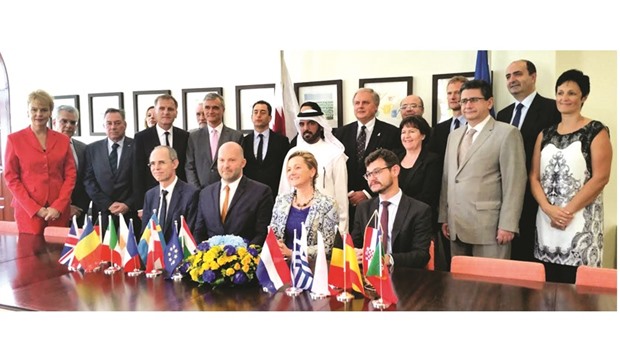The first European Union National Institutes for Culture (Eunic) cluster in the GCC region has been established in Qatar, it was announced yesterday.
The objective is to reinforce and expand cultural ties between EU member states and Qatar.
The Eunic cluster aims to promote cultural and linguistic diversity, develop exchanges between European and Qatari youth and foster European and Qatari artists exchanges.
The stakeholders of the Eunic cluster in Qatar are the embassies of Austria, Belgium, Bulgaria, Croatia, Cyprus, France, Germany, Greece, Hungary, Italy, Poland, Portugal, Romania, Spain, Sweden, the Netherlands, as well as the British Council and the French Institute.
All of them have signed the founding charter. Hosted by the embassy of the Netherlands in its capacity of the local presidency of the EU Council in Qatar in the first half of 2016, the official signing ceremony saw the presence of a representative of the Ministry of Foreign Affairs of the state of Qatar as well as Faleh al-Ajlan al-Hajiri, director of the Culture and Arts department, representing HE the Minister of Culture and Sports Salah bin Ghanem bin Nasser al-Ali.
Eunic is Europe’s network of national cultural institutes, with 35 members from all 28 EU member states and offices in over 150 countries. Eunic members work in the arts, languages, youth, education, science, society, intercultural dialogue and development.
At local level, Eunic members join together in over 100 clusters - in cities, regions and countries - to collaborate in common projects and programmes and to promote the role of culture in the EU’s internal and external relations.
The Eunic Global Office in Brussels supports the work of Eunic clusters around the world.
Eunic promotes cultural diversity and dialogue and advocates for a stronger role for culture in public policies and in external relations, both at European and international level.
By means of its clusters, Eunic has a strong capacity to deliver collaborative transnational projects connecting culture and society, as well as significant potential for training and research in cultural diplomacy and cultural relations.

The stakeholders of the Eunic cluster in Qatar with Faleh al-Hajri.
